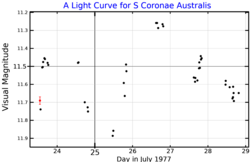S Coronae Australis
Appearance
 A visual band light curve for S Coronae Australis, adapted from Mundt (1979).[1] The error bar shown on the left-most point applies to all points. | |
| Observation data Epoch J2000.0 Equinox J2000.0 (ICRS) | |
|---|---|
| Constellation | Corona Australis |
| Right ascension | 19h 01m 08.59709s[2] |
| Declination | −36° 57′ 19.8950″[2] |
| Apparent magnitude (V) | 10.91[2] |
| Characteristics | |
| Spectral type | G0Ve + K0Ve[3] |
| Variable type | T Tau[3] |
| Astrometry | |
| Radial velocity (Rv) | −33 ± 5[4] km/s |
| Proper motion (μ) | RA: −2.6 ± 5.8[2] mas/yr Dec.: −9.8 ± 2.3[2] mas/yr |
| Distance | 460 ly (140[3] pc) |
| Details | |
| Other designations | |
S CrA, S Coronae Australis, HH 82 | |
| Database references | |
| SIMBAD | data |
S Coronae Australis (S CrA), is a young binary star system estimated to be around 2 million years old located in the constellation Corona Australis. It is composed of a G-type main sequence star that is about as luminous as and just over twice as massive as the Sun, and a smaller K-type main sequence star that has around 50-60% of the Sun's luminosity and 1.3 times its mass. Both stars are T Tauri stars and both show evidence of having circumstellar disks. The system is around 140 parsecs distant.[3]
References
[edit]- ^ Mundt, R. (April 1979). "Spectroscopic and photometric variations of the YY Orionis star S CrA". Astronomy & Astrophysics. 74: 21–29. Bibcode:1979A&A....74...21M. Retrieved 14 December 2021.
- ^ a b c d e Zacharias, N.; Finch, C. T.; Girard, T. M.; Henden, A.; Bartlett, J. L.; Monet, D. G.; Zacharias, M. I. (2012). "The fourth US Naval Observatory CCD Astrograph Catalog (UCAC4)". VizieR On-line Data Catalog. Bibcode:2012yCat.1322....0Z.
- ^ a b c d Carmona, A.; van den Ancker, M. E.; Henning, Th. (2007). "Optical spectroscopy of close companions to nearby Herbig Ae/Be and T Tauri stars". Astronomy and Astrophysics. 464 (2): 687–95. arXiv:astro-ph/0701208. Bibcode:2007A&A...464..687C. doi:10.1051/0004-6361:20065509. S2CID 14372262.
- ^ Ralph Elmer Wilson (1953). "General Catalogue of Stellar Radial Velocities". Carnegie Institute Washington D.C. Publication. Carnegie Institution of Washington. Bibcode:1953GCRV..C......0W. LCCN 54001336.
